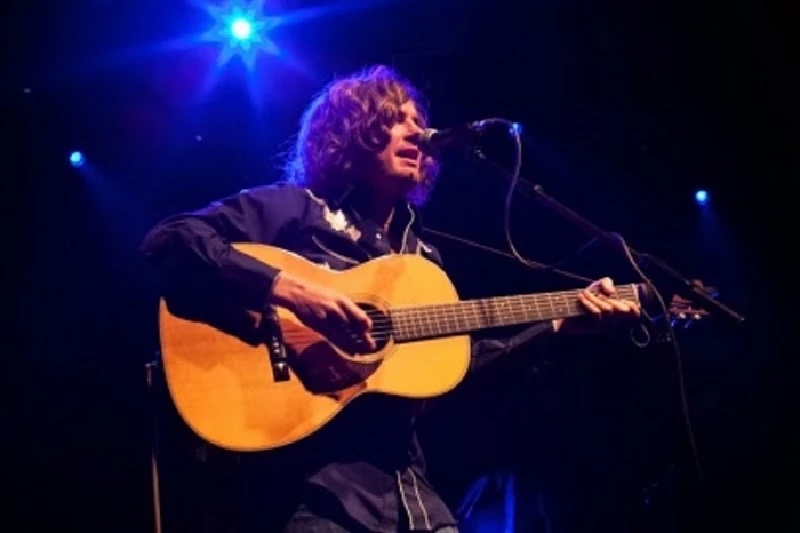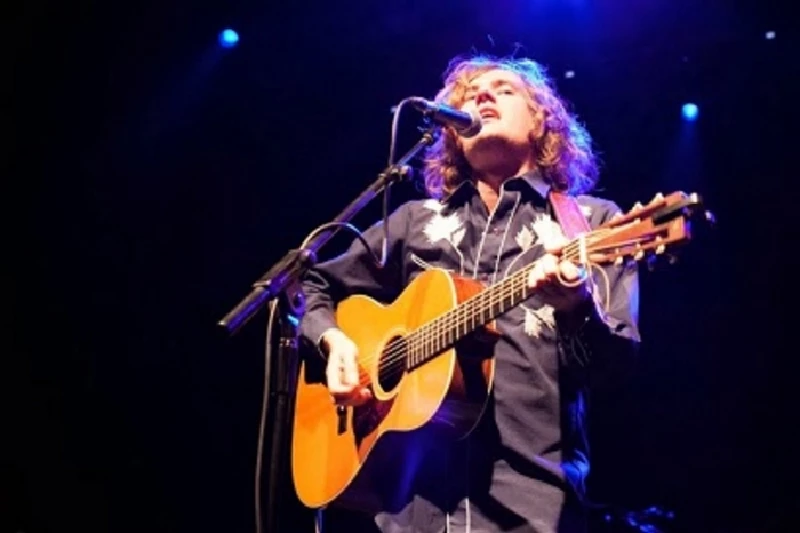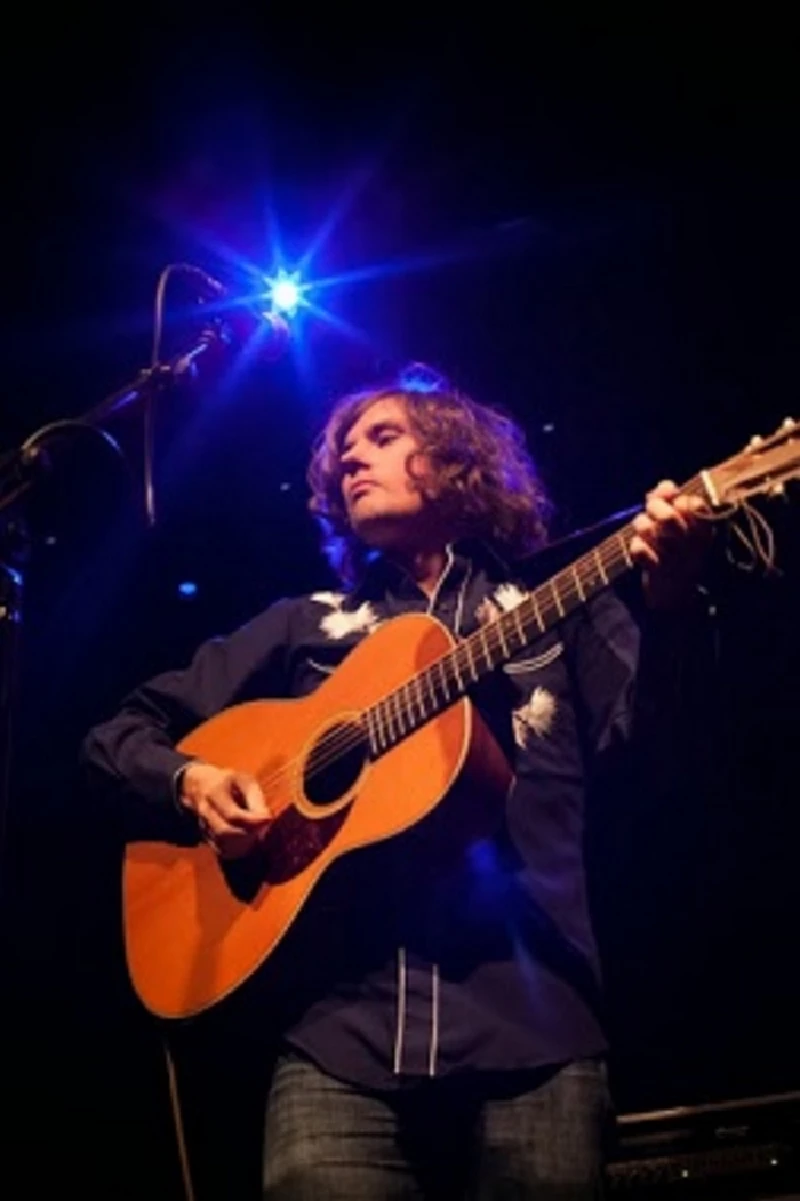Mike Hughes - Interview
by Harry Sherriff
published: 14 / 12 / 2013

intro
Harry Sherriff talks to Sheffield-based singer-songwriter Mike Hughes about supporting Miles Kane and his forthcoming debut album
2014 is going to be a good year for Mike Hughes, and therefore a good year for music. Sheffield singer-songwriter Hughes has his eye firmly on May as the month he unleashes his debut album, currently titled 'All Who Wander Are Not Lost', onto the world, and. if the free EP on his website, his lead single 'Misery' and his colossal live performance supporting Miles Kane back in September are anything to go by, it’s sure to get a lot of people’s attention. The singer-songwriter is teaming up with fellow Sheffield musician and producer Ross Orton whose CV includes Arctic Monkeys, MIA and Drenge to bring to life what Hughes refers to as his apocalyptic gospel blues. The live EP on Mike’s website was recorded in two days, and the huge potential is clear to see. It features strong varied songwriting capped off with great vocals. The EP even features a stripped down version of Hughes’ second single, 'The Road', due out February. I can’t wait to hear what Orton adds to these already impressive tracks. I met Mike before the first of his two shows supporting Miles Kane at Eric’s in Liverpool. We met in the Leaf Tea Shop on Bold Street. PB: We first saw you supporting Miles Kane in Manchester. What is a concise timeline up to that point? You were saying you were in a band? MH: Yeah. We got signed and it went tits up. We recorded an album that the label wouldn’t release, so we had to get out of the deal. That was around 2009-2010. PB: Was that your first band? MH: Yeah. I had all these songs, and I wasn’t going to do anything with them, I just started doing a few gigs. Just acoustic because I wanted to play again. So, I had this stuff building up and people would ask, “What are you going to do with them?” but I wasn’t really bothered until people actually said, “You should come into my studio,” and a few people offered different things, so I went in and did a few demos. About two and a half years ago, Phil, who’s in Miles’ band, said, “You should get these songs down, and I can help you”. PB: How did you come to meet Ross? MH: I’d got a band by this point, and we did our first gig with Ross’s band on the same bill. So he said, "Come in and just me and you will build these songs." So, the first thing we did was 'Misery' and he said, “I’m going to start giving this out to people,” and then more people came and said, “We’ll look after this and give it to radio and press.” That’s when 6Music picked it up and Radio 2. PB: hen we saw you in Manchester you were on your own, so what happened to the band? We’d done Misery and that was going to radio and then Miles said why don’t you come and do these gigs, we’ve already got a support but why don’t you just jump on a train and do them acoustic? They’re big places to fill with acoustic but that also became a nice challenge. PB: What was your first band called? MH: Little Ze. PB: Who were you signed to? MH: I don’t even remember what they were called. An independent anyway, but they’d started the label and we were the first band on it, and it was this fellow who turned out to be a dodgy fucker (Laughs). PB: It’s always ominous when you’re the first band they’ve signed, I think. MH: It all smelt of bullshit from the start, but we went with it because we got a bit of money to record the album. Then he sat on it for six months, which turned into another nine months and then a year, and in the end we had to get out of the album deal. PB: How hard was that? MH: We had to get a lawyer in to speak to him and then he said, “No, I’m going to release it,” and then we gave him another six months and he still wouldn’t. That's why I didn’t do any gigs for a while when the band finished because I just got fucked off with it. PB: When you did the demos last year did you have a job to get by or was it purely focussd on the music? MH: I work freelance. I do web design. So, it was just a case of them coming to Sheffield for two weeks. My mate has a studio and he gives me proper mate’s rates. We did fifteen-hour days for two weeks! By the end we’d recorded twelve to thirteen songs. I felt three to four were right, and even then I wasn’t sure the sound was right. Then when I met Ross he said, “We’ll reimagine this. It’ll get better”. PB: Who do you have behind you now? MH: I have no label and no management. There’s just people on the fringes who are helping out. There’s a fellow in London who deals with radio. There’s been a couple of people who have said, “We’ll see how the second single does and then we’ll talk to you,” but I just have the plan of releasing the singles then the album. So unless anything changes from now and then, the album will be out in May. I’m re-recording it with Ross at the start of the New Year. PB: I wasn’t expecting it to be that quick. MH: I think because it feels like it’s been hanging around for ages I just want to get the first one out there, and then start writing the next one at the end of next year. PB: I think that’s great because the other option is just lingering on it and hoping someone comes in. MH: I also think what are you waiting for, for someone to come in? Unless it’s a major with three hundred grand that want to push it in a certain way… It’s all building up, and I just want to do more gigs next year and start on the second album. PB: Will the album be the thirteen songs? MH: No, probably eleven or twelve. PB: Do you want to gig with a band? MH: Yeah. I just like turning up to do the acoustic thing,but the songs are sounding a bit bigger now. I get bored of the one-man acoustic thing. That’s why I try and belt it out a bit. That one man "woe is me" is fucking boring. PB: What’s your writing process like? Do you writing stuff constantly? MH: There was one I wrote two days ago that I might play tonight. I was trying to write the lyrics on the train before. I don’t like rerecording stuff, but working with Ross is great because he finds what makes it interesting again. Sometimes I’ll pick the guitar up, and it feels like I can’t even play it. You’ve just got to do it a lot. PB: Are you the type that gets up and puts in five hours in the morning? Or is that just not you? MH: No. I can’t do that. At home I’ll always be doing something. I’ve got a ukulele, which sounds weird. I read this interview with Bowie once, and he said he wrote 'Lust for Life' on a ukulele, and I know what he means now because if it works on that and sounds good it’ll work. PB: Do you record on your iPhone? MH: Yeah. Thousands of memos and then lyrics come way after. The good ones come quick, It’s a cliché but it’s true. Sitting on trains is always good. PB: How does that work? MH: I’ll just listen to the melody non-stop, and try and piece lyrics together. PB: Do you set a goal of when I get to ten songs I’ll go to the studio? MH: No it can be that day. 'Misery', for example, we got in one take basically. I knew how I wanted the drums and the band are great, so they got it straight away. PB: How did you first meet Miles’ band because that’s a massive bonus to have them help you record a load of songs? MH: Well that was Phil (Miles’ bassist) telling me I was a lazy arse. I was supporting Maybel Love in Sheffield, and George (Miles’ rhythm guitarist) was in that band, and after the gig Phil said, “You should really get these songs recorded soon,” and he got it together. PB: Why weren’t you pushing it yourself? It seems like quite a few people saw the merit before you and had to force you to do it! MH: I don’t know. I look back now and go, "What were you doing? … I really liked someone asking you on a Thursday to do a gig on the Friday and you turning up and doing a song you wrote two days ago. I loved all that." PB: What are your aspirations with the album? Are you thinking about certain labels? Or is that not healthy? MH: If you plan for that and it doesn’t happen, I’ll probably feel bad. I’d rather keep moving, and if something comes along and it feels right I’ll go with it. It would be nice to have someone help me sort some things out. PB: It’s also a massive decision isn’t it? I’m always fascinated with what factors into that decision. MH: I’m not sure what a label does now anyway. I’m not totally anti-label. I’m not saying, “You can do it all yourself now! It’s a democracy!” There are two sides of it; you could have Mr Big from Mr Big Records and it can be a disaster. You can have Domino come in and it’d probably be amazing, but then what do you want that label to do for you? PB: It seems like you have a great group of friends that can help you make tough career decisions? Can you imagine being younger and not having those contacts? MH: If you wait for people to come to you and say,“We’ve been watching you for awhile. If you’d like to come through this door, everything will change for you!” That’s kind of like saying I have no idea how some things turn out. PB: That’s when you start to get silly videos. MH: Yeah. It should be about working with the best people. PB: I wanted to ask you about Jake Bugg and the fact he decided to record his second album in Malibu. Now I’m sure you’re thinking of recording your album in Sheffield. MH: Where else but Sheffield? It’s like Malibu but you get the weather (Laughs). PB: It received two stars in 'The Guardian' but focused on mainly where it was recorded. Do you think it’s harsh to criticise an artist for that? MH: I heard some of the singles and I wasn’t vibing the production. I was like, “You’ve got Rick Rubin and it just sounded… it sounded like Cast.” PB: I feel like if he waited longer and recorded it in Nottingham or London he’d probably have come out with something a bit more special. MH: Yeah. I think if you’re a journalist that story is set up for you. A good album is a good album. If you leave it too long you struggle as well. I wouldn’t be surprised if there was a meeting with people saying, “Right we’ve got Rubin in. The first album did well. Now let’s crack America”. PB: Jake Bugg also had a go at One Direction for not writing their own songs, but then he co-writes with a lot of people on both albums. What’s your take on that and would you co-write with anyone on your debut album? MH: I can’t really do it because they’d have to see me in my boxer shorts in the morning. I’m interested in the art of writing songs but you can’t be too precious. Slagging off One Direction is like shooting fish in a barrel. PB: What impressed you in 2013? New acts or old? MH: The new Arcade Fire album is good. Bill Ryder-Jones’ album I loved. The Kanye West album is genius. Bill Callahan’s album is amazing as well. PB: What do you think of Kanye in general? MH: He’s batshit crazy. He’s constantly in bat country. The best thing I’ve heard all year is when he is literally seething because he thought he invented leather bottoms. PB: Do you think it’s harder for a solo artist or a band to get to a point where they don’t have to pay the bills? MH: Both. The logistics of four people chipping together I guess, four people are better than one but the songwriter might get paid more and that can cause problems. The solo guy gets more control though. PB: How did you first get on the radio? MH: Someone just sent it in to four different people, and he emailed me back telling me 6Music are going to play it and XFM really like it. PB: You’re giving away a free EP on your website? How did you decide on that? MH: Firstly I’m not totally for giving away music for free. I believe you should get something. I think if the model was you go and record an album for twenty grand and then you give it away for free we’re all fucked! People asked me if I was going to release 'Misery' as a free download, and I was like “Well…no,” and they said, “You really need to get something out for free,” and I was just like, “You can fuck off.” I’m not going to get Ross in, giving up all his time and my time on something we’ve worked really hard on to give it away for free. I can sing into a microphone with an acoustic guitar and you can have that. PB: So how did the free EP come along? MH: That was just a mate’s studio and we recorded it in two days. PB: Sometimes bands give away weak songs and that can’t be good. MH: Well, there’s always the option of giving away a B-side but that’s their first impression. PB: Does it get lonely touring on your own? MH: I don’t know. I like it. I’ve been in some horrible vans in my time. To the point where you don’t want to talk to anyone. PB: Has the album got a title? MH: A working title: 'Not All Who Wander Are Lost'. PB: Whose career would you like to emulate? MH: Jamie Carragher. Ultimate professional from the first kick of the ball and a constant stream of quality. PB: But you’ll struggle at international level? MH: Yeah. Just don’t call me a bottler. PB: Thank you. The photographs that accompany this article were taken by Marie Hazelwood.
Picture Gallery:-


most viewed articles
current edition
Screamin' Cheetah Wheelies - Sala Apolo, Barcelona, 29/11/2023 and La Paqui, Madrid, 30/11/2023Anthony Phillips - Interview
Difford and Tilbrook - Difford and Tilbrook
Rain Parade - Interview
Oldfield Youth Club - Interview
Autumn 1904 - Interview
Shaw's Trailer Park - Interview
Cafe No. 9, Sheffield and Grass Roots Venues - Comment
Pete Berwick - ‘Too Wild to Tame’: The story of the Boyzz:
Chris Hludzik - Vinyl Stories
previous editions
Microdisney - The Clock Comes Down the StairsWorld Party - Interview
Michael Lindsay Hogg - Interview
Heavenly - P.U.N.K. Girl EP
Ain't That Always The Way - Alan Horne After The Sound of Young Scotland 2
World Party - Interview with Karl Wallinger
Joy Division - The Image That Made Me Weep
Dwina Gibb - Interview
Steve Harley - Interview
Prisoners - Interview
most viewed reviews
current edition
Marika Hackman - Big SighSerious Sam Barrett - A Drop of the Morning Dew
Rod Stewart and Jools Holland - Swing Fever
Ian M Bailey - We Live in Strange Times
Loves - True Love: The Most of The Loves
Paul McCartney and Wings - Band on the Run
Autumn 1904 - Tales of Innocence
Roberta Flack - Lost Takes
Banter - Heroes
Posey Hill - No Clear Place to Fall
Pennyblackmusic Regular Contributors
Adrian Janes
Amanda J. Window
Andrew Twambley
Anthony Dhanendran
Benjamin Howarth
Cila Warncke
Daniel Cressey
Darren Aston
Dastardly
Dave Goodwin
Denzil Watson
Dominic B. Simpson
Eoghan Lyng
Fiona Hutchings
Harry Sherriff
Helen Tipping
Jamie Rowland
John Clarkson
Julie Cruickshank
Kimberly Bright
Lisa Torem
Maarten Schiethart